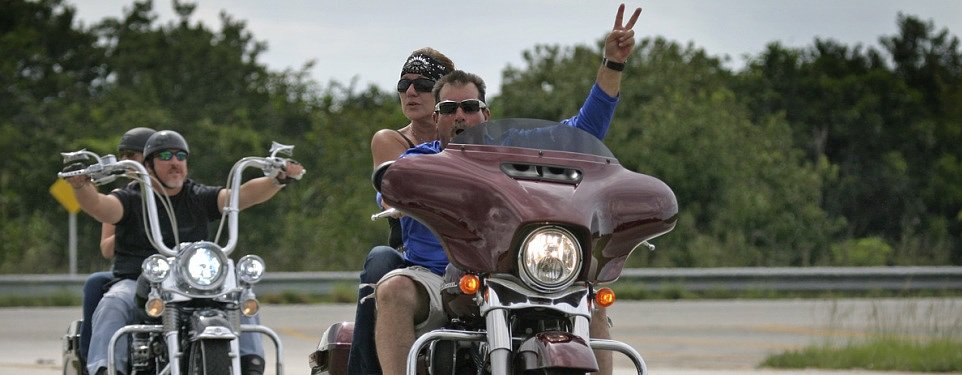The long and tangled history of motorcycle helmet laws in the United States got a new twist with a proposed law in Nebraska that would give riders the freedom to choose not to wear a helmet, but forces them to pay for a new Brain Injury Trust Fund. I believe the bill will be controversial, however, because it appears to grant personal freedom to some at the expense of others.
Nebraska Sen. Dave Bloomfield introduced LB900 last month. The bill would make several changes to existing Nebraska laws. Riders over 21 would no longer be required to wear a helmet. The bill would create a “Motorcycle Safety and Brain Injury Trust Fund” and provide funding for motorcycle safety awareness and education programs by increasing the cost of motorcycle registrations from the current $6 to $25. The bill also would prohibit those younger than 8 from even being on a motorcycle on Nebraska roadways.
Though motorcyclists would fund the Brain Injury Trust Fund, they would not be the only ones benefiting from it.
“The main purpose of the fund is to help meet the needs of individuals in Nebraska who suffer from a brain injury. This fund would be designed to help no matter the cause of the brain injury. The most common cause of such injuries in Nebraska is from unintentional falls, followed by motor vehicle accidents,” Bloomfield wrote. Up to 2.5 percent of the fund could be used for the awareness and education programs and no more than 10 percent of the fund could be used to cover administrative costs.
One of the arguments used to oppose repealing helmet laws, especially among those who don't ride, is the "social burden" theory. The assumption is that repealing a helmet law will lead to more serious brain injuries and some of those will not be covered by private insurance, leaving the public to pay the costs. In some states, legislators have approached the "social burden" argument by proposing that riders who did not wear helmets would be required to have high levels of insurance. The Nebraska bill is the first we've seen that takes the approach of setting up a fund to help those who suffer brain injuries, whether on a motorcycle or otherwise.
Two questions are unanswered though. What is the cost, or "social burden," if any, of repealing a mandatory helmet law? If there is a cost, who should pay for it?
In the past, the American Motorcyclist Association has refused to endorse legislation that would require higher insurance coverage in exchange for not being required to wear a helmet. The AMA's position states: “The costs associated with the treatment of motorcyclist injuries account for a tiny fraction of total U.S. health care costs. A miniscule portion of these costs is attributable to unhelmeted motorcyclists, the majority of which are paid by privately purchased insurance.”
When asked about LB900 specifically, an AMA representative referred to their position statement and gave assurances they were tracking the legislation.
The National Highway Traffic Safety Administration takes a different viewpoint: “When these laws are repealed, helmet use decreases, and injuries and associated costs increase, far exceeding the number of new motorcycles registered.”
Is there a cost? Research exists that supports both sides of the issue. Then there's the other question. Should only motorcyclists pay to fund a Brain Injury Trust Fund that could benefit anyone who suffers such an injury? Should motorcyclists in Nebraska who want to wear a helmet all the time be forced to support the fund so other motorcyclists can choose not to wear a helmet?
This payment model is not a new one. States such as Pennsylvania and Illinois, for example, provide free rider training programs, complete with motorcycles to take them on. Both states fund these programs with mandatory fees collected from motorcycle registrations. Under LB900, the potential financial ramifications for not wearing helmet would be paid for by not just the helmetless, but by those motorcyclists who are using personal protective equipment. Similarly, many states require motorcyclists to carry uninsured/underinsured motorist coverage, which effectively transfers the cost of the uninsured directly to those who are already carrying insurance.
Should the costs associated with a crash be paid by all motorcyclists? Or should only the users who elect not to wear a helmet pay into the Brain Injury Trust Fund? Or would it be more equitable still to only require those who do not wear a helmet and transfer the cost of brain injury to society to contribute to the fund? Consider, too, as the pool of potential contributors shrinks, the amount paid into the pool would have to increase, perhaps significantly. Should the government even be intervening in attempting to mitigate risk in what some see as a recreational activity?
Nebraska’s LB900 may change the way freedom, economic impact, and financial responsibility are defined. For now, though, it seems as though most stakeholders have more questions than answers.































 Riders Preferred Membership
Riders Preferred Membership

